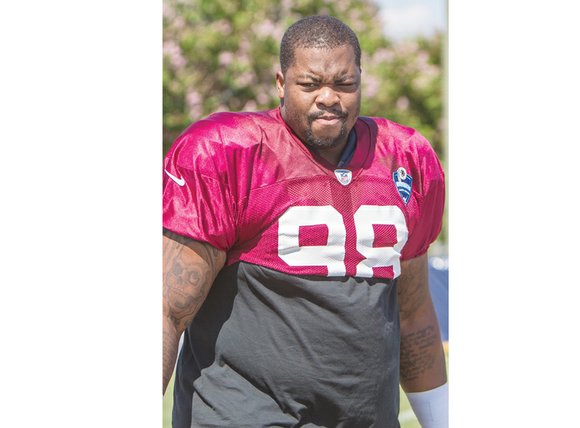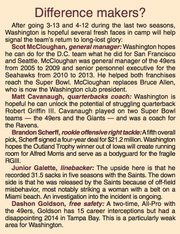‘Pot Roast’ beefs up Washington’s defense
Fred Jeter | 8/7/2015, 1:40 p.m.
Terrance Knighton came to a crossroads as a 270-pound nose tackle and tight end at Milford Academy in New Berlin, N.Y.
Knighton’s coach, Bill Chaplick, suggested these options for his future:
He could pass up second helpings of mashed potatoes and gravy, slim down to 250 pounds and concentrate on being a tight end.
Or he could eat all he wanted and play the nose.
It’s obvious the direction Knighton took.
“Hey, I got to college and the food was free,” he said with a laugh.
Now known as “Pot Roast,” Knighton is a 6-foot-3, 331-pound — “before ordering dinner,” he says — free agent nose tackle for the Washington NFL franchise.
He concedes he has rattled the scales at close to 350 pounds in the past, but adamantly denies any “big oaf” references.
“I haven’t always been big like this,” he told the media at the team’s training camp in Richmond.
“People seem surprised when I tell them I used to be a receiver … but I had pretty good hands and pretty good feet.”
Knighton, 29, is one of several free agents signed by Washington that Coach Jay Gruden is counting on to help his struggling team escape from a two-year, 7-25 funk. The team was 4-12 last season.
Knighton, a former second round draft pick out of Temple University, signed a one-year, $4 million contract to wear an XXL-size burgundy and gold uniform. He played previously for Jacksonville and then Denver in the 2013 Super Bowl.
Coach Gruden views Knighton as a potential demolition ball in the middle of the defense. Even on a field full of hulking men, Knighton stands out as the one best suited to block out the sun. It’s fitting he has a big jersey number to match — No. 98.
“You see how big he is, but you don’t realize how quick his first step is,” said Coach Gruden. “You don’t often see that in a man his size.”
At the NFL combine, Knighton ran the 40-yard dash in 5.22 seconds and in the standing long jump, he jumped 8 feet, 7 inches.
Here’s how Knighton describes his role:
“I’m a run stopper. I take up a lot of room. It’s my job to be disruptive.”
Being king-sized has helped Knighton make money on and off the gridiron. He has appeared in several humorous commercials for Bridgestone Tires. In one, a passenger in the car he’s driving says the “tires get up to 80,000 miles.” Knighton counters: “That’s a lot of trips to the grocery store.”
In another, he opens an empty refrigerator and, in a forlorn tone, says, “We’ve got a situation here.”
Knighton is adept at getting and giving nicknames.
In high school, he went by “Mutton Chop.”
The “Pot Roast” tag came from his Temple University teammate Clint Ingram, who heard Knighton ordering a meal on the road.
Since moving to the Washington team, Knighton has christened the defense “Capital Punishment.”
“I want our defense to be organized chaos — 11 maniacs running to the ball,” he explained.
From the “small world department,” Knighton played high school football with Washington’s incumbent nose guard, Chris Baker from Hampton University.
“Chris was much bigger than myself in high school,” said Knighton. “He had about 30 scholarship offers. I had two” — Temple and Central Florida University.
Baker, listed at 6-foot-2, 325 pounds, figures to see more time this fall on the flanks of Washington’s three-man front.
Other new faces on the defensive line are Stephen Paea, 6-foot-2, 300 pounds, and Ricky Jean-Francois, 6-foot-3 and 297 pounds. Paea, who grew up in Tonga, comes from Chicago; Jean-Francois, of Haitian ancestry, comes from Indianapolis.
Weighing “three bills” — 300 plus — was once an NFL rarity. Now it’s common. There are some 20 players on Washington’s preseason roster listed at 300-plus pounds.
Perhaps the first Washington 300-pounder was Wilbur Young out of William Penn College in Iowa. Young played for Washington in 1981 and later coached Monticello High School in Charlottesville to a state title.
More recently, Washington had a horrid experience with another gargantuan nose guard, Alfred Haynesworth, who signed a seven-year, $100 million contract in 2009.
Haynesworth reported to camp out of shape, was ineffective on the field and eventually was traded to New England for a fifth-round draft choice.
By comparison, Knighton is a bargain.
His short-term contract is more of the put up or shut up variety.
“Another year to prove myself,” he said. “I’m here for leadership and to dominate the line of scrimmage.”







